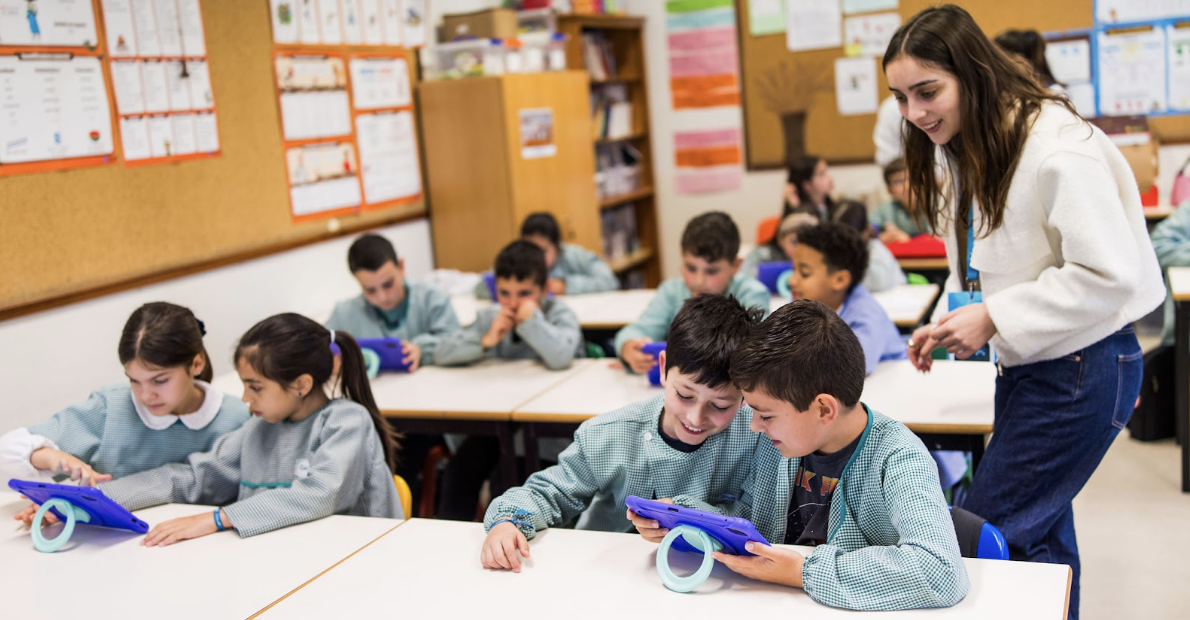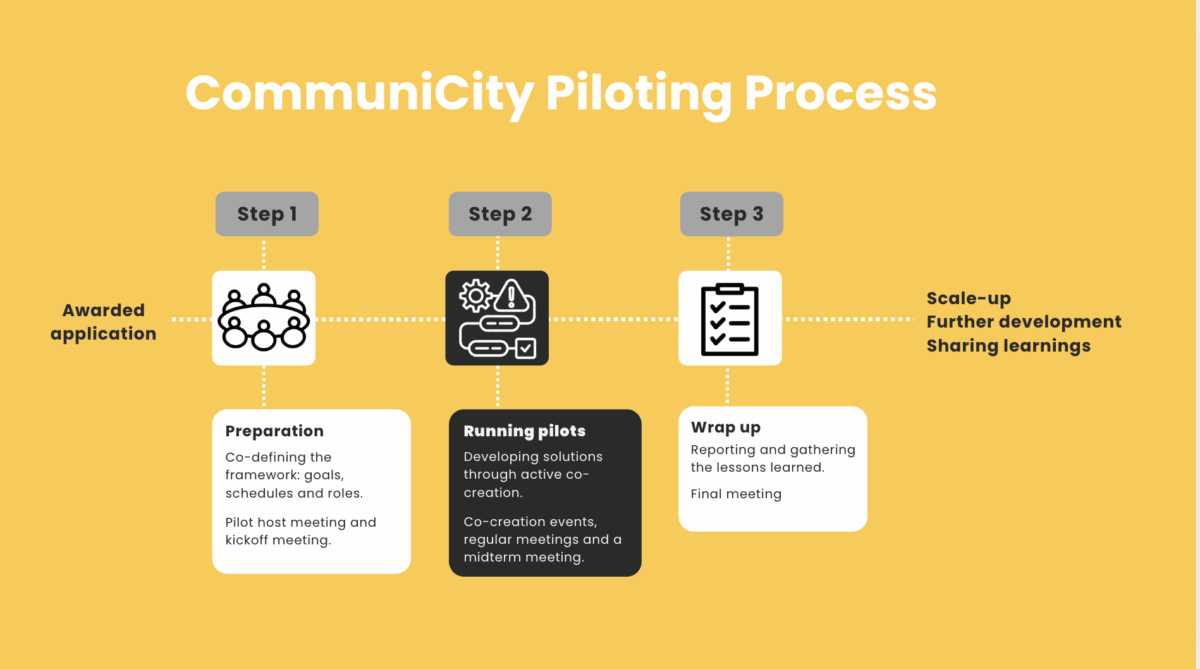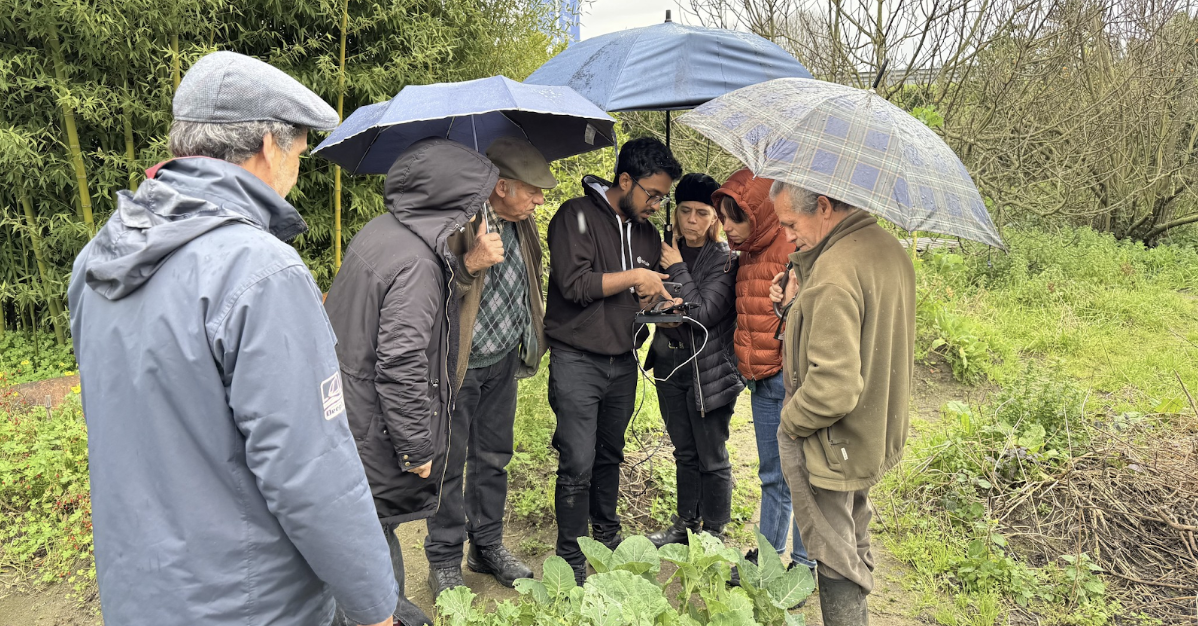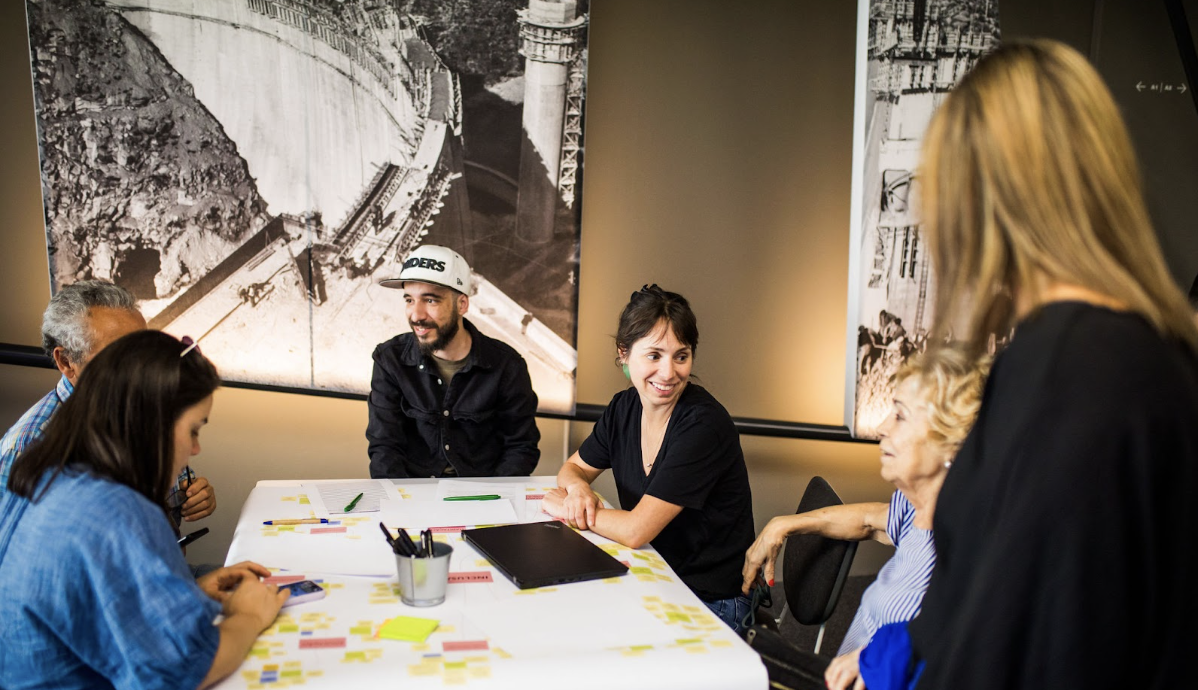
The purpose of the pilot is to test the value proposition and functionality of the service or product in its core target group. Product and service piloting gives the opportunity to reveal and solve potential problems of the product in the technical, usability and process integration areas.
The CommuniCity pilots are carried out in a real-life environment and the evaluation is done by the best experts in the industry creating value for all parties involved. The method applied in the CommuniCity pilots is called Agile piloting. Agile pilots are well-suited for developing and piloting innovative solutions.
The pilots are a lightweight and quick way to collect user feedback from different stakeholders, as well as understanding the functionality and impacts of new services and technologies. The pilots provide cities with first-hand experience with new solutions of the future. This makes their planning and decision-making processes easier. In turn, businesses get to see how the solutions they provide work in real life and how these solutions should be developed further based on the needs of users.
At best, businesses can place new services on the market, find new customers or establish new cooperation, e.g. in the form of projects. Sometimes pilot programmes also lead to corporate partnerships or other synergies between different operators.
One pilot consists of three main phases. The first is the preparation phase which covers co-creating a framework for the pilot and ensuring all involved parties have a shared overall picture of the roles and activities. The second phase deals with running the pilot, including meetings and co-creation events, as well as initial payments. The last and third phase, reveals how the pilot will be completed, including sharing the learnings, as well as reporting and final payments.
The three steps of a piloting process are: preparation, running pilots and wrap up. Each of these phases are described in detail in this toolkit.

The CommuniCity project aims to create a model and guidance for European cities to independently organise open calls and run pilot programmes. This work happens through organising three rounds of open calls and running 100 pilots. Theme of the challenges and pilots is to find innovative technical solutions to bridge the digital divide and enhance the well-being of marginalised communities.
In the First CommuniCity Open Call Round three partnering cities Amsterdam, Helsinki and Porto organised an open call resulting in 10 challenges and 13 pilots. The pilots kicked off in May 2023.
The Second Round of CommuniCity Open Call expanded to four new cities; Aarhus, Breda, Prague and Tallinn. These seven cities identified 20 challenges resulting in 25 pilots. The pilots of the second round were running from December 2023 until summer 2024.
The Third Round of CommuniCity Open Call was launched in September 2024 resulting in piloting between December 2024 and July 2025. New cities joined in to find solutions which help the lives of marginalised groups. Altogether, there were 15 cities and 63 pilots in the third round. During the final round, the participating cities were: Amsterdam, Bruges, Cuneo, Helsinki, London, Manchester, Matosinhos, Milazzo, Plock, Porto, Prague, Sant Boi de Llobregat, Sarajevo, The Hague, and Utrecht.
Each open call round is a learning experience not only to the piloting parties but also to the project partners gathering the learnings to be shared to all European countries in the form of this CommuniCity Manuals.
The open call process remained consistent across all rounds:
Challenge – cities identify the challenges they want to address.
Open call – city-specific challenges and open call documents are published.
Selecting pilots – expert jury members of each city evaluate the applications. Piloting contracts are signed.
Piloting – winner applicants and cities pilot the solutions in collaboration with end users.
Wrap up – achievements and learnings of the pilot are gathered and shared within the pilot stakeholders and to other interested parties. Evaluation of potential continuation of the collaboration or scaling up follows.
The more detailed information of the CommuniCity pilot process is described in the following chapters of this toolkit.

Photo: Rootcode, Porto, CommuniCity project
Stereoscape Ltd, headquartered in Helsinki, has introduced an innovative interactive map for social services. A web-based solution called DigiGuide was developed in collaboration with the City of Helsinki’s Rehabilitative Work Activities department. It aims to transform how customers discover pertinent services and units offered by the city.
Accessible online via any smart device with a web browser, the interactive map underwent an extensive client-centric design process, incorporating feedback from collaborative sprints and user testing sessions. Developed iteratively with Stereoscape and the city department, the DigiGuide on Mapme platform facilitates seamless navigation and access to crucial information.
During the design sprint, workshops with city employees nurtured open communication, ensuring alignment with client expectations. Through user testing and one-to-one interviews, valuable insights were gathered to enrich user experiences and refine functionality.
Recognising a disparity between the initial concept and client expectations, the team pivoted towards a solution aligned with user needs, prompting the exploration of new software and platforms. This experience not only honed communication strategies but also deepened comprehension of accessibility considerations, ultimately enhancing workflows and user experience practices.
By prioritising user needs and fostering collaboration, DigiGuide pledges to streamline access to rehabilitative services, marking a significant milestone in digital innovation for Helsinki’s workforce.
Image: Service map for the clients and staff members of Rehabilitative Work Activities of the City of Helsinki to visualise the different locations and services of the unit.
Co-creation is a method of development in which organisations and residents work together and equally to achieve a common goal, while producing value for themselves and each other. Residents are often the end-users of the innovative solution. In some cases the end users can also be the employees of the municipality (pilot host).
Learn more about co-creation:
When designing technological solutions, it is essential to work closely with the communities for whom the solutions are intended. While a wide range of methods can be found in literature and online resources, not all are equally effective in every context. In particular, when collaborating with marginalised groups, certain approaches may be more appropriate, and specific aspects of co-creation may require additional care and sensitivity. CommuniCity gathered tips and methods specifically relevant for co-creating tech solutions with marginalised groups.
Good practices for co-creation with marginalised groups:

Photo: CommuniCity project
Co-creation is one of the election criteria in CommuniCity pilots and all pilots are expected to incorporate this method. The pilot team is in charge of executing the co-creation activities.
Every pilot is different when it comes to theme, participants, technical solution and piloting environment. Accordingly each pilot should choose the co-creation tools that suit the best for them. Read more about recommended tools such as Design Sprint and Deep Dive.
The pilot manager may oversee multiple pilots addressing one or several challenges. Encouraging collaboration and co-creation among these pilots is recommended.
By facilitating interactions between pilot hosts and teams, valuable insights and learnings can be shared across different stages of the piloting process. This exchange of knowledge can greatly benefit all involved parties and enhance the overall success of the pilots.
In Amsterdam, dinners were organised for delegations of the pilot stakeholders. As the response to these dinners was very positive, we can recommend the format we applied.
The main goals of these dinners were twofold. The first was collecting feedback for future open calls and similar projects. The second goal was increasing the awareness of the pilot teams that they were not merely working on their own tech solution, but they were part of a larger ‘movement’, the CommuniCity project.
The dinners were designed with these two specific goals in mind. It was important to us that participants would feel free to speak their mind and also provide criticism. To foster this, we aimed for delegations consisting of:
We thought it was important that only one person of the pilot host and one person of the pilot team attended the dinner, as we did not want them to feel they had to check their suggestions or criticisms with their colleague before voicing them.
The program was as follows:
A short elaboration on these five parts of the programme:
The journey of co-creation in Porto stands as a testament to the power of co-creation and collaborative innovation, particularly in addressing the needs of marginalised groups within the community.
This process spanned from the initial stages of identifying the needs of these groups to the development of the solution and implementation of solution features, all grounded in the principles of co-creation.
The commitment to this approach did not end upon the conclusion of the pilot phases; instead, it further manifested through a workshop that joined all hosts and pilot teams. This session was for sharing insights, fostering networks, and discussing future enhancements.
Co-creation session in Porto. Photo: CommuniCity project.
An example of this co-creative work is encapsulated in the WeSolve pilot project, which aimed to enhance the engagement of elderly individuals within the community. This initiative, a collaboration with the Association of Cerebral Paralyses of Porto (APPC), sought to mitigate social isolation among seniors by leveraging the WeSolve platform as a tool for fostering connections and facilitating meaningful activities.
The project’s goals were ambitious yet clear: promote community cohesion, reduce social isolation, and evaluate the effectiveness of digital platforms in achieving these ends.
The implementation of WeSolve was characterised by a keen emphasis on co-creation, with the onboarding process designed to ensure accessibility and ease of use. Health care providers and managers of the APPC were encouraged to engage with the platform at their own pace, leading to a seamless adoption process and active usage throughout the pilot phase. The feedback received was overwhelmingly positive, with participants lauding the smooth transition to the digital tool and its role in fostering a sense of community and belonging.
Even after the pilot’s conclusion, the spirit of co-creation continued. APPC expressed a keen interest in maintaining the platform, with plans to adjust its features and user interface to better meet the community’s evolving needs. This willingness to adapt and improve, based on collaborative input and shared experiences, highlights the enduring impact of the co-creation process. It not only addresses immediate challenges but also lays the groundwork for sustained engagement and community development.
In summary, the co-creation journey in Porto, exemplified by the WeSolve pilot, underscores the significance of collaborative efforts in designing and implementing solutions that responded to the needs of marginalised groups. Through continuous dialogue, shared learning, and a commitment to improvement, this approach promises to foster more inclusive, engaged, and vibrant communities.
Main photo: CommuniCity project